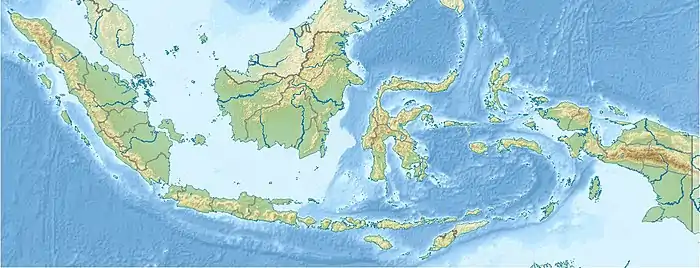| Cyclops Mountains | |
|---|---|
| Pegunungan Cyclops, Pegunungan Dafonsoro, Pegunungan Dobonsolo | |
 | |
| Highest point | |
| Elevation | 2,160 m (7,090 ft) |
| Geography | |
 Cyclops Mountains Location in Western New Guinea | |
| Location | Papua, Western New Guinea, Indonesia |
The Cyclops Mountains (Indonesian: Pegunungan Cycloop) are located to the west of Jayapura and north of Lake Sentani, in Papua, Indonesia. In Indonesian, the range is also known as Dafonsoro or in Sentani language, Dobonsolo.
The nearby football club Persidafon Dafonsoro is named after the area.
Geography
The highest point is Ifar Gunung at 2,160 m (7,090 ft)[1] or 2,158 m (7,080 ft).[2]
History
The Cyclops Mountains were given this name by Louis de Bougainville, who saw them from a distance while sailing along the north coast of New Guinea.
In the 1930s Evelyn Cheesman spent time in this area studying the insect fauna.[3]
In 1978, and reaffirmed in 1995, the Cyclops Mountains were designated as a nature reserve.[4][5]
Ecology
The portions of the range above 1,000 meters are part of the Northern New Guinea montane rain forests ecoregion. The lower slopes and surrounding lowlands are in the Northern New Guinea lowland rain and freshwater swamp forests ecoregion.
The Cyclops long-beaked echidna (Zaglossus attenboroughi) was discovered living in the mountains. It is named for naturalist David Attenborough.[6]
| Cyclops Mountains Nature Reserve | |
|---|---|
| Pegunungan Cyclops Nature Reserve | |
| Location | Papua, Western New Guinea |
| Nearest city | Jayapura |
| Area | 225 km2 (87 sq mi) |
| Established | 1978[4]/1995[5] |
A species of lizard, Emoia cyclops (Cyclops emo skink), is named for the Cyclops Mountains.[7]
References
- ↑ Vaisutis, Justine (2007). Indonesia. Fort Mill, South Carolina: Lonely Planet. p. 835. ISBN 978-1-74104-435-5.
- ↑ "Cyclop Mountains". Papua Insects Foundation. Retrieved 9 February 2017.
- ↑ Tuzin, Donald F. (1997). The Cassowary's Revenge: the life and death of masculinity in a New Guinea society. Chicago: University of Chicago Press. p. 86.
- 1 2 "Pegunungan Cyclops". ProtectedPlanet. 2014–2016. Retrieved 9 February 2017.
- 1 2 "Papua: Cyclops Landscape". LESTARI/USAID. Retrieved 9 February 2017.
- ↑ James, William (9 November 2023). "Long-lost mammal rediscovered in remote Indonesia mountains". Reuters.
- ↑ Beolens, Bo; Watkins, Michael; Grayson, Michael (2011). The Eponym Dictionary of Reptiles. Baltimore: Johns Hopkins University Press. xiii + 296 pp. ISBN 978-1-4214-0135-5. ("Cyclops", p. 63).
2°30′59″S 140°34′58″E / 2.51639°S 140.58278°E